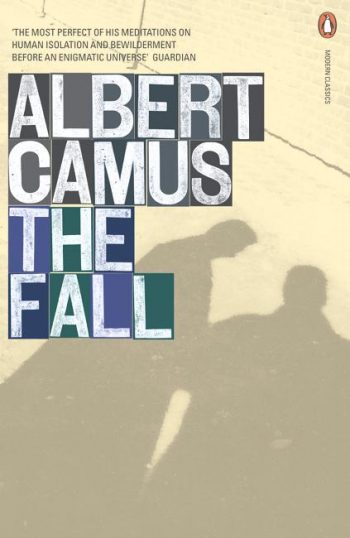The Fall – Albert Camus – 1956
Reviewed by: Bill Stratton Date: 31 December 2001
Aside from being Camus’ crowning literary achievement, this work should also be viewed as one of the most important works of twentieth century literature. It is also, perhaps, the most representational work of fiction in the existentialist genre, far surpassing the work of Sartre. “The Fall”, aside from being a great work, is also a masterful technical achievement, and a lesson in character development and monologue. The plot revolves around a Parisian Lawyer by the name of Jean-Baptiste Clamence and his conversation with an anonymous man at an Amsterdam bar. As the story progresses the reader is gradually overwhelmed by the lawyer’s increasingly serious confessions.
 With no scenery to distract his reader’s attention from the intensity of the conversation, Camus succeeds brilliantly in drawing the reader towards his anti-hero’s tortured dénouement. As the tension grows with each new admission, Camus slowly, yet meticulously, reveals the fragile relationships that humans have with the disconnected other, as well as the delusional images that, as a result of this isolation, is projected upon the self. In Clamence’s simple confessional out-pouring of emotion, the reader witnesses the gradual spiritual ruination of one who at first calls to find such a figure as Thackery’s resourceful Tom Jones, a seemingly content and successful man, who is gradually transformed and reduced into an alienated, and shattered human being; a mere shell of the individual that he once strived to be.
With no scenery to distract his reader’s attention from the intensity of the conversation, Camus succeeds brilliantly in drawing the reader towards his anti-hero’s tortured dénouement. As the tension grows with each new admission, Camus slowly, yet meticulously, reveals the fragile relationships that humans have with the disconnected other, as well as the delusional images that, as a result of this isolation, is projected upon the self. In Clamence’s simple confessional out-pouring of emotion, the reader witnesses the gradual spiritual ruination of one who at first calls to find such a figure as Thackery’s resourceful Tom Jones, a seemingly content and successful man, who is gradually transformed and reduced into an alienated, and shattered human being; a mere shell of the individual that he once strived to be.
“The Fall” is similar to “The Stranger” in the way that the psychological tension is subtly built upon, inevitably moving towards a final disheartening, yet liberating, personal understanding. But, unlike “The Stranger” there is no closure for the subject or release from the psychological torment of reflection, only the curse of endless confession, not only concerning his own individual crimes, but also for his inherent complicity in all the crimes of humanity.
One can only speculate as to how Camus would have continued this line of inquiry if he hadn’t been tragically killed in an automobile accident at the age of 46. As it stands we can only continue to enjoy and contemplate what he left behind. For as long as literature exists writers will continue to delve into the deepest recesses of the human psyche and attempt to provide a flicker of light in, an all to often, dark and absurd world. After reading this book I can say that Camus accomplished this goal like few writers ever have, and his body of work will continue to represent a effervescent light amid the confusion of an often cruel, absurd world.
















